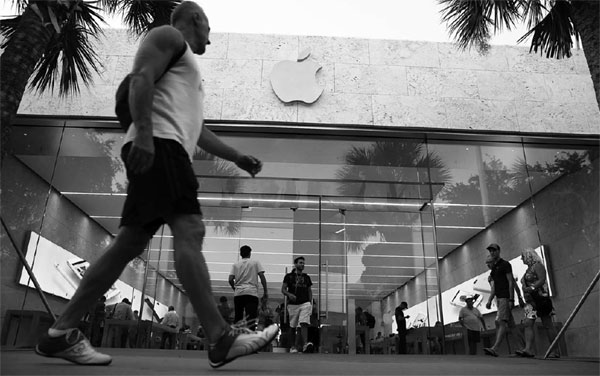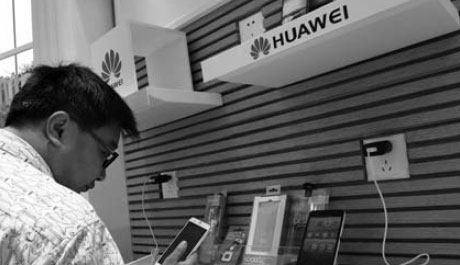Apple faces major 'roadblocks' after losing trademark battle
Chinese experts said Apple Inc is facing "alarming roadblocks" to its prospects in China.
The California-based tech giant, which has been widely successful in China since it launched its first smartphone in the Chinese market in 2009, lost a trademark fight when the Beijing Municipal High People's Court ruled that Xintong Tiandi Technology Ltd, a little-known leather accessories maker in the capital, could continue to use the "IPHONE" trademark on its range of wallets, phone cases and handbags.
Xintong Tiandi filed for Class 18 protection of its "IPHONE" trademark in 2007.
|
An Apple store in Miami, Florida. Investors have reacted negatively to the tech giant's announcement that it experienced drops in sales and profit for its second fiscal quarter. Joe Raedle / Getty Images |

Experts in China speculated that company CEO Tim Cook may schedule more stops in China this year. In previous years, he has averaged about two visits per year.
Apple announced last week that it would appeal to China's Supreme Court to protect its trademark rights. The company filed a trademark bid for the "iPhone" name in 2002, but it was not approved until 2013.
Lei Yongjian, a lawyer at Beijing-based Wan Hui Da Intellectual Property Agency, said according to China's trademark law, Apple must prove that iPhone was already a well-known trademark in the country before Xintong Tiandi registered it.
Apple faced a similar issue in China a few years back and paid $60 million to buy the iPad trademark from a Chinese company.
The court ruling comes after Apple announced the financial results for its second fiscal quarter in 2016 that showed a 22.5 percent drop in profits on slower iPhone sales.
Revenue in China dropped 26 percent compared to the same fiscal quarter last year. Stock analysts at Sterne Agee CRT predicted that revenue for the 2016 fiscal year in China may fall 15 percent year-on-year.
The news created anxiety in Chinese stock markets. US investor and billionaire Carl Icahn told Consumer News and Business Channel on April 28 that he has sold all his holdings in Apple due to what he called the company's dim prospects in China.
"We no longer have a position in Apple. Tim Cook did a great job. I called him this morning to tell him that, I told him it's a great company. He seemed sort of sad to hear that," Icahn said in the interview.
Icahn said his sell-off wasn't about "the price, it is about China. I think it's a very cheap stock. But China could be a shadow for it, and we have to look at that".
He had purchased stock in Apple about three years ago and made about $2 billion from the sale.
On April 22, Apple's iTunes movies and iBooks store were closed down in China for about six months because of Chinese regulations introduced in March that called for strict curbing of online publishing, especially by foreign companies.
Apple issued a statement saying that it hoped to "make books and movies available again to its customers in China as soon as possible".
haonan@chinadaily.com.cn
Huawei starts charging licensing fees on tech giant
For the first time, a Chinese smartphone manufacturer has begun charging US tech giant Apple Inc a licensing fee.
Huawei Technologies said it signed confidentiality agreements with Apple and would not be disclosing the specific figure.
A report from Guangdong provincial intellectual property office that monitors patents shows that Huawei licensed nearly 770 patents covering GSM, UMTS and LTE wireless communications technologies to Apple last year, while Apple licensed 98 patents to Huawei.
The Chinese company credited its heavy spending on product research and innovation for its patents. By the end of last year, Huawei filed 52,550 patent applications in China and over 30,000 patent applications in foreign countries.
In 2015, it ranked first in the world with the most international patent applications filed through the Patent Cooperation Treaty and ranked fourth in Europe with nearly 2,000 patent applications.
|
A customer tries a Huawei smartphone at a shop in Yichang, Hubei province. Liu Junfeng / For China Daily |
(China Daily 05/11/2016 page17)










